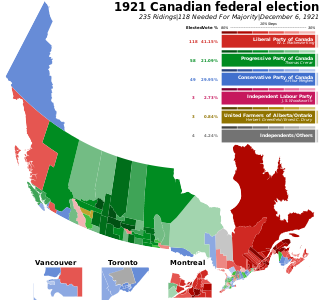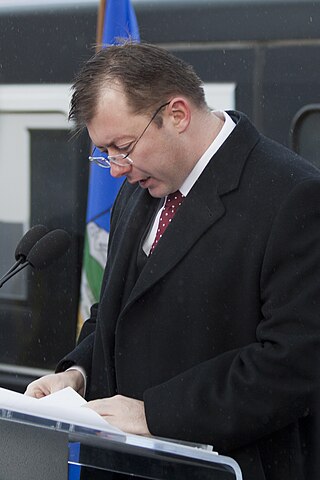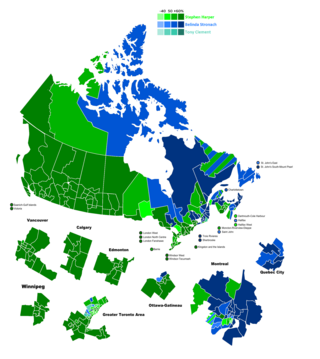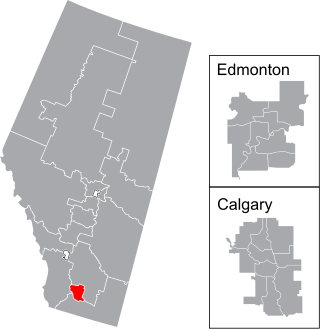
The Canadian Alliance,formally the Canadian Reform Conservative Alliance,was a centre-right to right-wing federal political party in Canada that existed under that name from 2000 to 2003. The Canadian Alliance was the new name of the Reform Party of Canada and inherited many of its populist policies,as well as its position as the Official Opposition in the House of Commons of Canada. The party supported policies that were both fiscally and socially conservative,seeking reduced government spending on social programs and reductions in taxation.

The Reform Party of Canada was a right-wing populist and conservative federal political party in Canada that existed from 1987 to 2000. Reform was founded as a Western Canada-based protest movement that eventually became a populist conservative party,with strong social conservative and fiscal conservative elements. It was initially motivated by profound Western Canadian discontent with the Progressive Conservative Party government of Brian Mulroney.

Ernest Preston Manning is a retired Canadian politician. He was the founder and the only leader of the Reform Party of Canada,a Canadian federal political party that evolved into the Canadian Alliance in 2000 which in turn merged with the Progressive Conservative Party to form today's Conservative Party of Canada in 2003. Manning represented the federal constituency of Calgary Southwest in the Canadian House of Commons from 1993 until his retirement in 2002. He served as leader of the Official Opposition from 1997 to 2000.

The 1997 Canadian federal election was held on June 2,1997,to elect members to the House of Commons of the 36th Parliament of Canada. Prime Minister Jean Chrétien's Liberal Party won a second majority government. The Reform Party replaced the Bloc Québécois as the Official Opposition.
The Conservative Party of Canada,colloquially known as the Tories or simply the Conservatives,is a federal political party in Canada. It was formed in 2003 by the merger of the two main right-leaning parties,the Progressive Conservative Party and the Canadian Alliance,the latter being the successor of the Western Canadian–based Reform Party. The party sits at the centre-right to the right of the Canadian political spectrum,with their federal rival,the centre-left Liberal Party of Canada,positioned to their left. The Conservatives are defined as a "big tent" party,practising "brokerage politics" and welcoming a broad variety of members,including "Red Tories" and "Blue Tories".

The 1921 Canadian federal election was held on December 6,1921,to elect members of the House of Commons of Canada of the 14th Parliament of Canada. The Union government that had governed Canada through the First World War was defeated,and replaced by a Liberal government under the young leader William Lyon Mackenzie King. A new third party,the Progressive Party,won the second most seats in the election.

Robert J. Anders is a former Canadian politician. He represented the riding of Calgary West from 1997 until 2015 and was a founding member of the Conservative Party of Canada.

Deborah Cleland Grey,is a retired Canadian member of Parliament from Alberta for the Reform Party of Canada,the Canadian Alliance,and the Conservative Party of Canada. She was the first female federal leader of the Opposition in Canadian history. She currently serves on the advisory board of the Leaders' Debates Commission.
The Unite the Right movement was a Canadian political movement which existed from around the mid-1990s to 2003. The movement came into being when it became clear that neither of Canada's two main right-of-centre political parties,the Reform Party of Canada/Canadian Alliance (CA) and the Progressive Conservative Party of Canada (PC),was independently capable of defeating the governing Liberal Party. The objective of the movement,therefore,was to merge the two parties into a single party. The goal of uniting the right was accomplished in December 2003 with the formation of the Conservative Party of Canada.

The 2004 Conservative Party of Canada leadership election took place on March 20,2004,in Toronto,Ontario,and resulted in the election of Stephen Harper as the first leader of the new Conservative Party of Canada. The Conservative Party was formed by the merger of the Canadian Alliance and the Progressive Conservative Party of Canada,in December 2003.
David Cameron Chatters was a Canadian politician. He was a member of the House of Commons of Canada from 1993 to 2006,representing the riding of Athabasca until the 2004 election,after which he represented Westlock—St. Paul.

Deepak Obhrai was a Tanzania-born Canadian politician,representing the riding of Calgary East and Forest Lawn for the Reform Party of Canada and then the Conservative Party of Canada from 1997 until he died in 2019. He previously served as the Parliamentary Secretary to the Minister of Foreign Affairs. He was the first and only Hindu to become an MP in Canada,and at the time of his death was the longest continuously serving Conservative MP. He ran in the 2017 Conservative Party of Canada leadership election,but was defeated in the first round of voting.

Monte Kenton Solberg,is a Canadian businessman and politician. Solberg is a former Member of Parliament,representing the riding of Medicine Hat in the House of Commons of Canada as a member of the Conservative Party of Canada. He was the Minister of Citizenship and Immigration and later served as the Minister of Human Resources and Social Development. He has also served as Critic for Foreign Affairs,National Revenue,and Human Resources Development.
The Canadian Alliance,a conservative political party in Canada,held two leadership elections to choose the party's leader. The first was held shortly after the party's founding in 2000,and the second was held in 2002. The party merged with the Progressive Conservative Party of Canada in 2003 to form the Conservative Party of Canada.

Calgary Southwest was a federal electoral district in Alberta,Canada,that was represented in the House of Commons of Canada from 1988 to 2015. The district was in the southwest part of the City of Calgary,south of Glenmore Trail and west of the Canadian Pacific Kansas City Railway line.

Scott Jeffrey Reid is a Canadian politician. He has served in the House of Commons of Canada since 2000,and currently represents the Ontario riding of Lanark—Frontenac—Kingston as a member of the Conservative Party.
Jim Silye is a Canadian politician,businessman,and former professional football player for the Canadian Football League.

Lethbridge is a federal electoral district in Alberta,Canada,that has been represented in the House of Commons of Canada since 1917. It incorporates the City of Lethbridge and Lethbridge County.
Richard M. Harris is a Canadian politician. He was a Member of Parliament from 1993 to 2015 and sat as a member of the Conservative Party of Canada. He was previously member of the Reform Party of Canada and the Canadian Alliance. From 2004 to 2015,he represented the electoral district of Cariboo—Prince George,and formerly represented Prince George–Bulkley Valley. He was first elected during the 1993 federal election and was re-elected in 1997,2000,2004,2006,2008 and 2011. He challenged Reform Party leader Preston Manning for leadership when Manning proposed merging the party with the Progressive Conservative Party of Canada. He later campaigned for Stockwell Day to become leader. The most prominent position he held with his party was Chief Opposition Whip from 2001 to 2002. He generated controversy when he appointed an unelected,Conservative Party member to represent a neighbouring electoral district in governmental affairs,though the electoral district had an elected Member of Parliament,but from an opposition party. In Fiscal Year 2009-10 he was the top spending Member of Parliament,and had the largest hospitality and lowest advertising expenditures of any house member.
Reed Elley is a retired Baptist minister who was elected to the Canadian Parliament in 1997 as a member of the Reform Party. He was reelected in 2000 and retired in 2004. Elley was born in Simcoe,Ontario and was educated at McMaster University in Hamilton,where he obtained a BA in History and an M.Div. in theology. He pastored several churches in the Baptist denomination in three provinces,Ontario,Alberta and British Columbia. In 1967,he married Louise Plester from Chemainus,British Columbia and they raised eight children—four children of their own as well as four foster children,three of whom are First Nations. Along with his wife,they fostered more than 155 children. Elley joined the Reform Party of Canada,then led by Preston Manning,in 1988 discovering that his political,social and faith views were very much aligned with Manning whom he admired. His first political activity was in 1992,when he ran a Vote No campaign on behalf of the Reform Party in the federal riding of Calgary Centre during the Charlottetown Accord constitutional referendum which he and the Party won. He then became an area manager for the Reform candidate Jim Silye. During that time he and his family moved to Vancouver Island,where he became involved in the winning campaign of Bob Ringma in 1993. After the election,he was asked to become president of the Nanaimo—Cowichan constituency association for the Reform Party.












